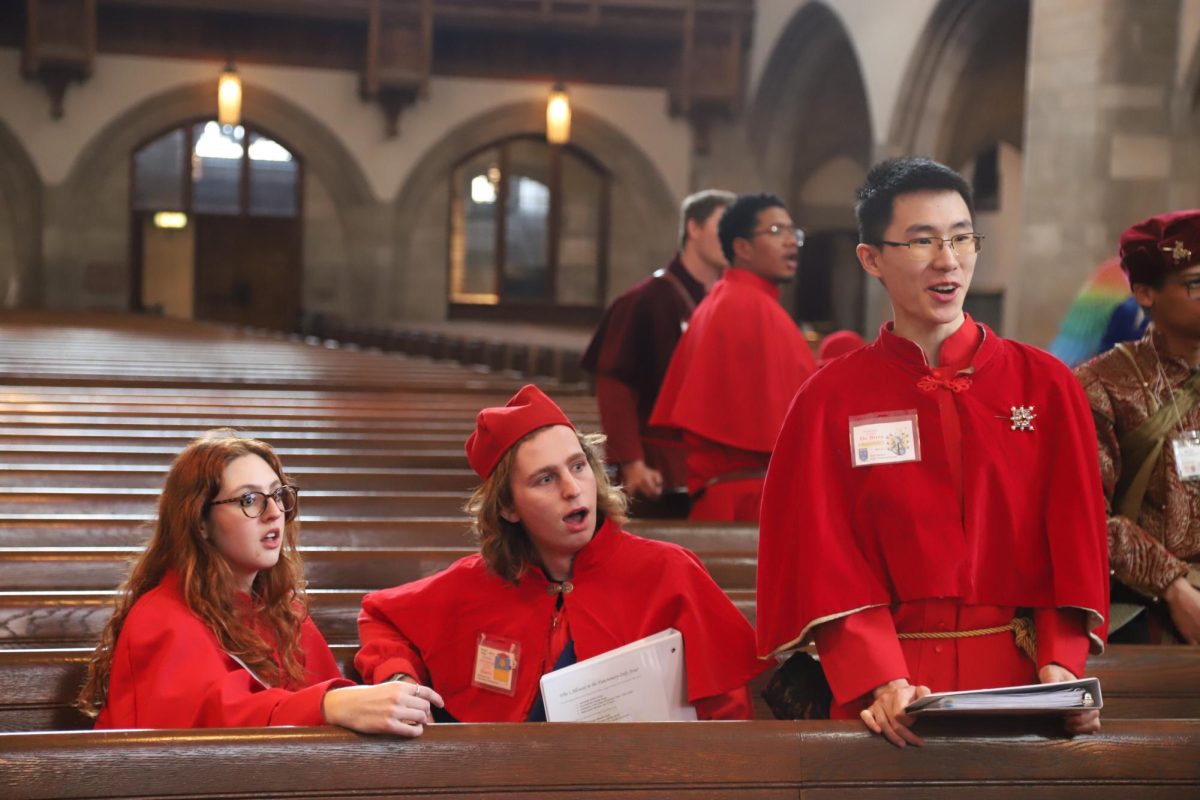UChicago creative writing professor Srikanth Reddy’s latest book of poetry, Underworld Lit, chronicles an absurd concurrence of personal crises set against the backdrop of the University of Chicago campus. An unexpected diagnosis of malignant melanoma, anxieties over the tenure process, and the state of constant emergency that accompanies raising a small child cause the book’s narrator to descend into a labyrinth of underworlds. After nearly a decade spent writing, Reddy’s personal fortunes turned around: His cancer was in remission, and he was a tenured professor. His book, with its poetic musings on death and burial, was published just in time for a global health crisis of historic proportions. Despite the book being published in August 2020, copies sold quickly—especially on the University of Chicago’s campus. The University purchased hundreds of copies, which it gave out during a delayed graduation ceremony for the Class of 2020 and during President Alivisatos’s inauguration.
“The University—which would seem like the last place that would actually want to buy copies of this book that’s complaining about the University all the time—has basically cleared out the warehouse,” Reddy joked in an interview with The Maroon. “Though my relationship with the University is complicated, it means so much to me. It’s where I feel happiest, most fulfilled, challenged and excited.”
Reddy acknowledged that he feels very distant from the personal crises and the “tonality of dread and absurdity” that originally inspired the book. He began writing during an extremely tumultuous time: He was going up for a tenure position within an English department that had never before granted it to a poet. Though he was successful in his tenure bid, it was a very confusing period intellectually, creatively, and professionally. This occupational scare was accompanied by both a shocking cancer diagnosis and the “amazing, beautiful crisis” of raising his young daughter.
“It was a very strange cancer diagnosis because brown skin people don’t usually get malignant melanomas—which is kind of the worst skin cancer you can get,” Reddy explained. “Whenever I walked into a check-up or meeting, there’d be all these residents taking notes because I was one of the only South Asian persons these doctors had seen with a melanoma. I’m in the medical literature now.”
When he started writing, Reddy was teaching the first course in the humanities sequence Readings in World Literature. His syllabus included multiple ancient poems involving different cultures’ underworlds: the Odyssey, the Mahābhārata, and The Epic of Gilgamesh. Confronted by his own mortality, Reddy recognized that he, like the characters of these epic poems, was also plunging into an underworld of his own. Surrounded by the vast labyrinth of literature that is the Regenstein stacks, he said, one is easily transported into the world of the deceased.
“You’re surrounded by the voices of the dead, you select some and re-emerge into the light of the day. There’s a kind of hauntedness about research, learning, and the study of previous cultures’ voices,” Reddy narrates.
Reddy explores his personal crisis through a fictional character—Chen—who journeys through different cultures’ underworlds. His tale begins with a scene that typifies Reddy’s often surreal style: “In the district of Hóu-tcheou-fou, the magistrate’s assistant Chen was taking a nap in his cabinet of pain. Suddenly, a motorized airport staircase appeared, and beckoned him to follow.”
Chen then journeys from the Mayan underworld of Xibalba to the Egyptian realm of judgment and rebirth, and finally to the Qing dynasty divine courts. Though the plot follows Chen’s adventure and his interactions with exotic characters, the book is inspired by the narrator’s experience translating these ancient foreign texts.
“The key to that journey to the underworld was translation. However, I’m not a good translator, so it’s full of mistakes which begin to take over the translations,” Reddy explained. “We worry about being right, faithful, or successful as translators, but I think there’s a whole universe that you can discover if you’re willing to embrace the errors and not put yourself under that pressure.”
Working on this book for over nine years, Reddy estimates, he wrote over ten times the material that was eventually published. He equates his writing process to “throwing a lot of stuff at a wall” to see what sticks, followed by a lot of rearranging. His narration shifts between real and imaginary life and different forms of writing. Student evaluations, faculty conversations, and office hours anecdotes are juxtaposed against imaginary underworld adventures, Rorschach tests, absurd 1–800 numbers (“callers to 1-800-Abaddon are routed to TrueFire, the leader in online guitar instruction”), preposterous course descriptions, and hypothetical quizzes.
At the beginning of the book, Reddy includes a real student evaluation he received, which deemed him “fairly intelligent” but “unreceptive, even intolerant, of anything that is not a poem or poetry in prose form.” Though harsh, Reddy views the witty elegance and the faint praise with a bemused satisfaction.
“You can see a student’s intelligence on display in the most rhapsodic, wonderful way because they’re so cutting in evaluations,” he said.
Reddy envisions a fictitious course description geared toward a classroom of such students: Hum 101: Introduction to the Underworld, which studies different cultures’ Books of the Dead. “Requirements include the death of the student, an oral report, and a final paper,” its description reads. The remainder of the book is peppered with an array of whimsical quizzes and class materials for the imagined course. One quiz reads:
3) The hero’s companion in the Epic of Gilgamesh dies of ____.
- Vehicle rollover
- Friendly fire
- Superficial spreading malignant melanoma
- Irrelevant question
While much of Reddy’s inspiration stems from his own interactions with students, some is also borrowed from the experiences of his wife Suzanne Buffman, who is also a UChicago creative writing professor. Reddy uses one of these borrowed narratives to exemplify the “annoying brilliance” of UChicago students. “What if I’m ideologically opposed to revision?” one student asks. In another scene, a student tells the professor to go to hell during an office hour meeting.
“Those three things—the real student evaluation, the story from my wife’s class, and the joke that becomes fictionalized—show how mixing reality with the imaginary can create a new reality that tells you more than a straight-up memoir would have done,” Reddy said.
Throughout the narrator’s harrowing adventure through the worlds of the dead and Reddy’s own anticipation of death, there remains a light humor that transcends the gravity of his present challenges. At the recent inauguration of UChicago president Alivisatos, Reddy read aloud an excerpt from his book dealing with his some of his frustrations with the University. The audience, with some restrained, quiet chuckles, seemed beset by the question, “Should I be laughing right now?” Reddy, for his part, believes that a lot of important conversations can be started with that seemingly inappropriate laughter. While some part of Reddy wanted to prime the audience with a warning that it’s okay to laugh, he decided that there is value in them discovering this on their own, just as he did.
“There’s this kind of heroic survivors’ narrative about this brave struggle with cancer which is not what I was experiencing. I felt ludicrous half the time in my hospital gown and being a South Asian person getting this cancer I’m not supposed to get,” Reddy said. “The way to make what was happening intelligible and meaningful was to see the humor in it. These absurd contradictions are always either going to be humorous or tragic in artistic form. I think that real humor makes people feel the tragedy of these contradictions too.”
Since the publication of the book, millions more COVID-19 deaths have left the specter of death hovering over those left behind worldwide. The recent shooting deaths of three University affiliates have unearthed anxieties and provoked conversations about death among community members. Reddy acknowledged the stressors of attending college during a pandemic.
“University students are in this crazy space where you’re surrounded by death in the news cycle but you’re a little bit protected from it, and also you’re made to feel—with good reason—responsible for protecting others [through social distancing and vaccinations]. That’s a really complex space to be in while you’re at university—away from home for the first time, learning, trying to figure out what you’re going to do with your life, falling in love, and freaking out about a pandemic,” Reddy said. “I’m kind of amazed by how stoic students at the University are—I would be a basket case.”
Reddy is taking the year off from teaching to edit a University of Chicago Press poetry book series that highlights contemporary voices and translations. He is also editing Poetry, a Chicago-based monthly poetry journal, which will release three issues in the Spring featuring migrant and refugee stories alongside ancient poetry from around the world. Next year, he will return to teaching Creative Writing workshops, and he half-jokes that he wants to attempt to actually introduce Underworld Lit to the University’s course catalog. Though he’d like to return to writing soon, he is overjoyed to have his book out in the world and hopes that the pandemic has given readers time to sit with the piece in a haunted, underworldly period of time.
“These different cultures’ underworlds are really a collective imaginary space for reflecting on not just death and what happens after death, but for thinking about our own worlds. The underworld is kind of a mirror world,” Reddy said, “Although I feel like I wrote this book as a lover’s quarrel with the University, I’m really glad that it seems to be finding a place here.”









